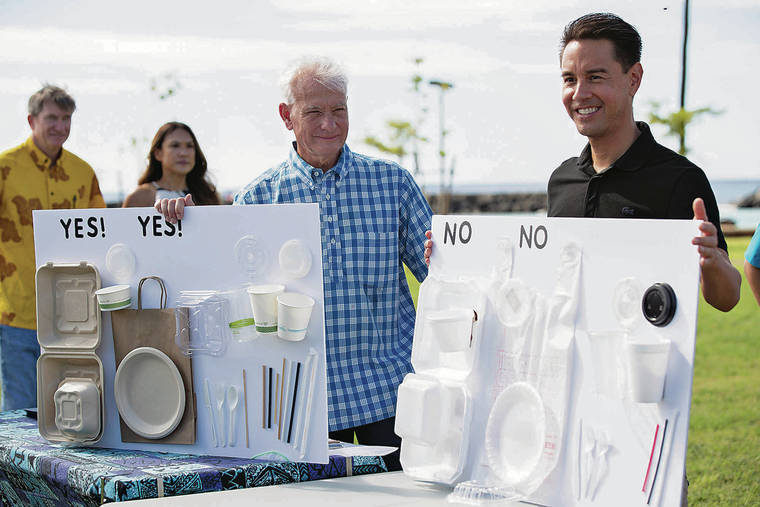Mayor Kirk Caldwell on Sunday signed into law one of the nation’s strictest bans on plastics, which will prohibit all single-use plastic plates, bowls, cups and service ware on Oahu by 2022.
Bill 40 was supported by environmental groups — including many college and high school students — who spoke of the long-term harm to the earth from continued plastic use. It was opposed by a broad spectrum of food industry and other businesses that said the bill is vague and requires too much too soon.
The bill’s effective date is Jan. 1, 2021, when plastic forks, knives and spoons would be banned while other types of service ware would be distributed to customers only upon request. The bulk of the prohibitions, however, will take place Jan. 1, 2022. That would include polystyrene and other plastic plates, bowls and other food ware, as well as the general sale of plastic products to food industry companies unless they have exemptions.
“Bill 40 is meant to protect the future,” said 17-year-old environmental activist Dyson Chee at a signing ceremony Sunday morning at Magic Island. “The best time to act on our issues on plastic pollution and the general issue of climate change was decades ago, but the next-best time to act is now.”
Chamber of Commerce of Hawaii President and CEO Sherry Menor-McNamara also spoke at the ceremony.
“You are wondering why is the Chamber here today. We are committed to engage on environmental issues. We understand that there is an urgent need to address climate change,” she said.
Menor-McNamara said she appreciated some of the amendments to the bill that addressed business concerns.
“From a business perspective, we want to make sure that policies are practical, rational and reasonable,” she added.
The bill was hotly debated, and both opponents and supporters held large rallies on the Honolulu Hale lawn to voice their views.
The Honolulu City Council approved the bill Dec. 4 on a 7-2 vote.
Councilman Joey Manahan authored the bill, saying it was about “the health and well-being of our oceans and our planet, our island Earth.”
Council Public Safety and Welfare Chairman Tommy Waters, who worked on the bill’s final language, praised the throngs of young people who testified in support of the bill.
Council members Carol Fukunaga and Ann Kobayashi voted no. Fukunaga said the vast amount of last-minute changes to the bill created a situation where stakeholders should have had more time to consider them.
The bill contains numerous blanket exemptions, including handleless plastic bags for loose items such as bakery goods, coffee and produce; and plastic used for packaging of raw meat and poultry, seafood and unprepared produce and prepackaged food, shelf-stable food and catered food.
The plan also allows for exemptions to be granted on a case-by-case basis under three different scenarios: situations where there are “no reasonable alternatives available” to a food vendor; situations where compliance would cause a significant hardship; and situations where an “industry exemption” may be warranted due to possible negative impacts to the entire food service industry.
“I support removing single-use plastics from the waste stream and reducing dependence on oil-based products, and I believe this legislation strikes a fair balance,” Caldwell said in a statement before the signing.




